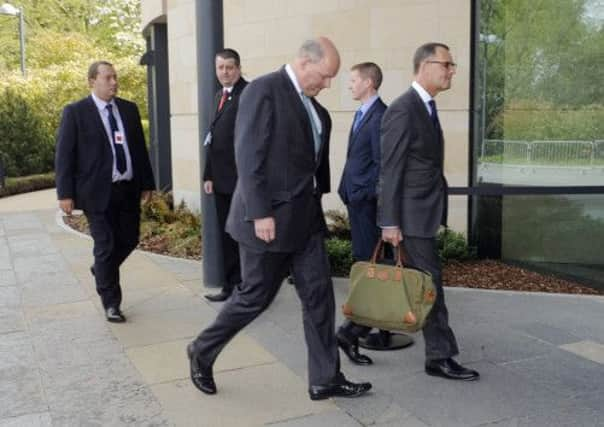Leaders: RBS boss is sacrificed in political game


As the dust begins to settle after Mr Hester’s surprise announcement, more details of what prompted his move have emerged. In the end, it came down to a clash between political and business imperatives which has profound implications for the bank, the way this country is run and for politics.
Mr Osborne, through UK Financial Investments – the body which manages the state’s stake in our bailed-out banks – told the RBS chairman, Sir Philip Hampton, the government wanted to start privatisation next year. The Treasury’s view was that as Mr Hester would have been in post for six years by then, speculation about his longevity would undermine the privatisation. Sir Philip, apparently believing he had no choice, agreed to see to it that Mr Hester stood down.
Advertisement
Hide AdAdvertisement
Hide AdWere this a normal company none of this would matter as much as it does with RBS. There are power battles in many major stockmarket listed firms, with major shareholders flexing their muscles and often dislodging chief executives.
However, RBS is not a normal company. The government owns more than 80 per cent of it. This has resulted in the bank becoming a chess piece in a political game being played in the run-up to the next UK election. Mr Osborne is desperate to say his government has begun the process of getting RBS off the taxpayers’ hands, possibly with a “tell Sid” populist public share offering. Mr Hester, it has been reported, was less than enthusiastic about this idea.
What is of most concern in this saga is what effect this row has on the bank and its staff, many in Scotland, for the future. Initial stock market reaction was negative, with RBS shares plunging.
Political reaction was also negative, with Mr Osborne facing accusations from Labour that he sacked Mr Hester which, in effect, he did.
Considering that, as he says in a memo to his staff, Mr Hester took RBS from a point where it “nearly died” a long way towards normality, the chief executive can rightly feel aggrieved at his treatment, though he may not win much public sympathy as he leaves with a substantial pay-off. However, in becoming a pawn in the electoral game the case of RBS illustrates once again that business and politics make uneasy bedfellows.
The row may subside, of course, but given the evidence we have so far, it is hard to avoid the conclusion that Mr Osborne has put party interest before that of a major company and the country. By his politically-motivated actions, he has substantially hindered rather than helped the process of RBS becoming what we all want it to be: a normal private sector company once again.
Modern poverty is a relative concept
The poor will always be with us. That phrase, derived from Jesus’s words in the New Testament, is often quoted in a modern context. It comes to mind again with the publication of the latest official statistics on poverty.
People are classified as being poor if their income is less than 60 per cent of the UK median. Given this is a relative, as opposed to absolute, measure, then we can say with mathematical certainty that the poor will always be with us.
Advertisement
Hide AdAdvertisement
Hide AdAccepting this, we should perhaps reflect on what exactly we mean by poverty and how its modern definition might be seen in an historic context.
A century ago, for example, there was little by way of a social security system. Unemployment could mean not just hardship but starvation. Large numbers of people lived in homes with no inside toilet, let alone a bath. There was no National Health Service.
Times have changed, and for the better. Our modern social security system, though far from perfect, should see to it no-one starves if they are out of work. Homes have toilets and baths or showers. Our health is ensured by the NHS. Most households, including many defined as being in relative poverty, have televisions, home computers and other mod cons.
So, in absolute terms, we are, almost all of us, better off – less impoverished if you will – than previous generations.
In making this point we accept there are pockets of severe poverty in Scotland, which shame our civilised society. Governments, charities and all of us as individuals must address this. It is important that recent improvements are continued particularly when circumstances are difficult.